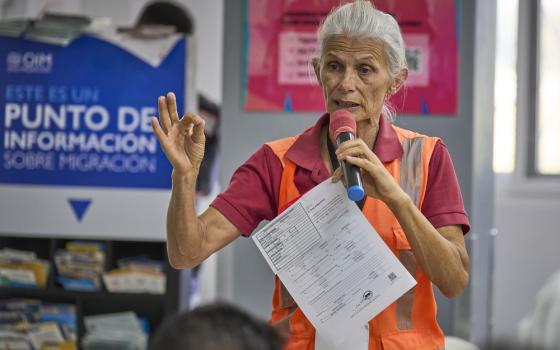Reviewed by Graham Yearley
Catholic News Service

| SOLIDARITY WILL TRANSFORM THE WORLD: STORIES OF HOPE FROM CATHOLIC RELIEF SERVICES by Jeffry O'Dell Korgen Orbis Books, 176 pages, $16. |
There is a widely held belief that evil makes more interesting reading than goodness. These two slim books show what a preposterous fallacy that belief is as they both entertain and show the workings of goodness in our world.
In Solidarity Will Transform the World, author Jeffry O'Dell Korgen takes the reader on a tour of five countries where Catholic Relief Services is transforming the way the First World relates to the Third World. CRS is the U.S. bishops' overseas relief and development agency.
We, the advantaged, traditionally think of charity as moving in one direction, from the privileged to the unprivileged; we feed, they eat. CRS projects work with one priority: to assist the poor in making their contribution to the common good.
By organizing self-help groups, by extending microcredit loans and by bringing together the wrongdoer and the victimized in a society decimated by genocide, CRS fulfills Pope John Paul II's belief that justice lies in every human being having the freedom to offer the gifts God gave him or her to the world.
In Mexico, small loans are offered to women to start small businesses. Experience has shown that women pay back their loans and plow the profits back into their businesses, rather than spending them on what we in the First World consider necessities. One-woman businesses quickly become the source of employment for three or four women.
In India, CRS organizes self-help groups for women to pool their resources, start businesses and support one another. One surprising offshoot of self-empowerment is that the violence inflicted on women by men in rigidly patriarchal cultures decreases in the homes of those in self-help groups.
In Rwanda, CRS, along with the Rwandan bishops' conference, brings together Hutus who murdered their Tutsi neighbors and survivors of the 1994 massacre. Whether the repentance Hutus feel or the forgiveness Tutsis offer is genuine is a question only God can answer, but the work of reconciliation is crucial in a country where division has physically and spiritually decimated a society.
* * * *

| THEY COME BACK SINGING: FINDING GOD WITH THE REFUGEES By Gary Smith S.J. Loyola Press, 226 pages, $14.95. |
In They Come Back Singing, Jesuit Fr. Gary Smith recounts his six years (2000-06) living in the refugee camps of northern Uganda as chaplain and relief worker. Refugees from the Sudanese war flooded across the Ugandan border and live in encampments the size of cities. Even in the relative safety of the settlements, life remains precarious and death can come suddenly.
Smith hears a thunderclap and knows lightning has struck nearby. What he doesn't know is that same lightning has struck a man pushing his bicycle on the road outside the camp and killed him with his wife and children standing horrified only a few feet away.
Hunger and disease are the constant companions of these refugees. Yet, out of these settlements of the poorest of the poor comes cohesive and sometimes even joyful community that shares both physical and spiritual sustenance.
Reading either of these books can reawaken hope in the most cynical of hearts as we learn that the riches of faith are given out equally in the kingdom of God.
(Yearley recently received a certificate of advanced study in theology from the Ecumenical Institute at St. Mary's Seminary and University in Baltimore.)


